New challenges for the Colombian intelligence community in a post-conflict future in a context of global hybrid threats
Abstract
Currently, the changes taking place in the international field have a direct impact on the security and defense strategies of states. The adaptation of these strategies translates into the modeling of state responses to the consolidation of complex criminal phenomena that manifest themselves globally. The updating of both security and defense policies and procedures that converge within a synergy of international action patterns is a priority for the maintenance of balance in both regional and global securitization strategies. In this sense, and maintaining the vanguard character of security policies, the transformation of the intelligence communities is of paramount importance. The adequacy of this in a state like Colombia, facing a possible future post-conflict scenario, is a fundamental decision that must be implemented to maintain a societal status in the regional and international coalitions that are established in the fight against the current hybrid threats.
Downloads
References
Buzan, B., Waever, O. y de Wilde, J. (1998) Security: A new framework for analysis. Boulder: Lynne Rienne.
Byman, D.(2008). Undesrtanding proto-insurgencies Journal of Strategic Studies,31(2),165-200. https://doi.org/10.1080/01402390801940310
Colom, G. (2012). El Enfoque Integral en los conflictos híbridos. En: VV. AA., El enfoque multidisciplinar de los conflictos híbridos. Madrid: Ministerio de Defensa.
Dixon, P. (2009). 'Hearts and Minds'? British Counterln-surgency from Malaya to Iraq. Journal of Strategic Studies, 32(3), 353-381. https://doi.org/10.1080/01402390902928172
Drew, D. (1988). lnsurgency and counterinsurgency. American Military Dilemmas and Doctrinal Proposals. Alabama: Air University Press.
García Cantalapiedra, D. y Díaz Matey, G. (2008a). EE.UU. y el papel de la inteligencia en conflictos asimétricos. UNISC/ Papers, (34). Madrid.
García Cantalapiedra, D. y Díaz Matey, G. (2008b). EEUU, el uso de la inteligencia y la doctrina de contrainsurgencia norteamericana: lecciones para Afganistán. Madrid: Real Instituto Elcano. Recuperado de http://www.raelinstitutoelcano.org/wps/portal/web/rielcano_es/contenido?WCM_GLOBAL_CONTEXT=/elcano/eleano_es/zonas_es/dt54-2008.
García Guindo, M. (2014). Movimientos insurgentes: El papel, capacidades y respuestas de los Estados. Revista Política y Estrategia, (123), 35-52. https://doi.org/10.26797/rpye.v0i123.57
Herrero de Castro, R.(2006). La realidad inventada. percepciones y proceso de toma de decisiones en política exterior. Madrid: Plaza y Valdés.
Hoffman,F. (2007). Conflicts in the 21th century: the rise of hybrid wars. Arlington: Potomac lnstitute for Foreign Policy Studies.
Keister, J. (2014). The illusion of chaos why ungoverned spaces aren't ungoverned, and why that matters. Policy Analysis, (766), 1-24.
Keohane, R.O. y Nye, J.S. (1998). Power and interdependence in the information age. Foreign Ajfairs, 77(5), 81-94. https://doi.org/10.2307/20049052
Kilcullen, D. (2010.) Counterinsurgency. Oxford University Press.
Long, A. (2006). On "Other War". Lessons form five decades of RANO counterinsurgency research. Santa Monica, CA: Rand Corporation.
Mao, T. (1973). La guerra prolongada. México: Ediciones Roca.
Matilla, K. (2011). Los modelos de planificación estratégica en la teoría de las Relaciones Públicas. Barcelona: UOC.
North, D, Wallis, J., Webb, S. y Weingast, B.(2007). Limited access orders in the development world: a new approach to the problems of development. Policy Research Working Paper, 4359. Washington: World Bank. https://doi.org/10.1596/1813-9450-4359
Pareja Rodríguez, l. y Colom Piella, G. (2008.) El Enfoque Integral (Comprehensive Approach) a la gestión de crisis internacionales. AR/ (15). Madrid: Real Instituto Elcano.
Pulido Gragera, J. y Sansó-Rubert, D. (2014). A phenomenological analysis of terrorism and organized crime from a comparative criminological perspective. Journal of Law and Criminal Justice, 2(2), 113-131. https://doi.org/10.15640/jlcj.v2n2a7
Pulido Gragera, J. (2005). La cooperación internacional entre servicios de Inteligencia. Al servicio del Estado: inteligencia y contrainteligencia en España (monografía). Arbor, 709. Centro Superior de Investigaciones Científicas (CSIC). https://doi.org/10.3989/arbor.2005.i709.507













